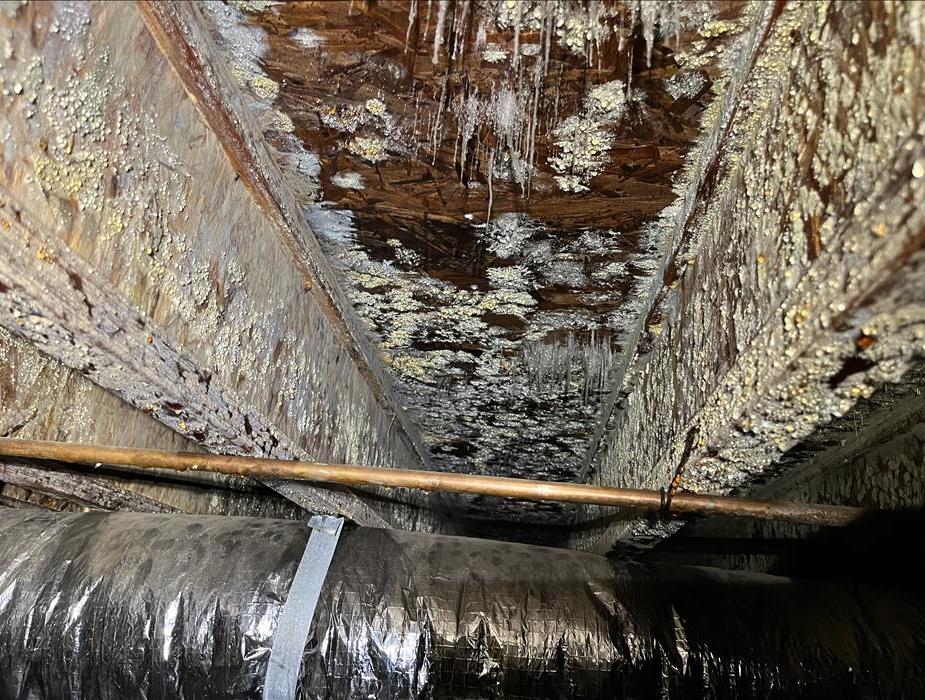Winter Water Damage Can Lead to Mold if You Don’t Act Appropriately
3/29/2023 (Permalink)
Winter Water Damage Can Lead to Mold if You Don’t Act Appropriately
Living in the High Desert of Central Oregon has its perks. We enjoy around 300 days of sunshine each year and direct access to world-class outdoor recreation. But we also have our fair share of severe storms with varying types of precipitation. Despite the storms and sometimes snowy winters, we have a very dry climate.
Now, when you think of mold, perhaps Florida or another tropical location comes to mind. But, many are surprised to learn that one of the most common calls we receive at SERVPRO of Bend is for mold remediation. We’ll explain why the High Desert is a hot spot for mold.
First, the basics. Mold is a microscopic spore that readily floats through the air. But mold isn’t a problem unless it has food. And mold food is moisture. As we mentioned, living in the High Desert has perks. And our dry climate means mold doesn’t have the food it needs to grow as readily as it does in more humid climates. Therefore, mold isn’t a big issue…until it is.
Water Damage and Mold - A Recipe for Disaster
With the freezing temperatures we’ve experienced this winter, there have been many frozen and subsequent burst pipes. The quick response to the average homeowner is to hire a plumber to address the burst pipe, mop up the water, and get on with the day. But, this is not usually the best course of action. Residual water that is not appropriately addressed becomes a breeding ground for mold spores - very quickly. Even our dry Central Oregon climate won’t dissuade hungry mold spores from tearing through your drywall.
So what’s hiding behind your walls?
Many homeowners with water damage won’t see mold as an issue until it has progressed and become a costly problem. You see, pipes that bust behind walls or in your crawlspace are hidden. Unless you tear out the walls (or go under your house), you won’t know a problem exists. And who wants to do that? You can wait and see if you notice the telltale scent of mold (it is musty). But even that is too late. So what should you do?
What to do in the event of water damage
- Act fast. Have a plumber fix the leak. Remove excess water by mopping it and then blotting it - including on furniture, carpets, upholstery, and cushions. Put aluminum foil between furniture legs and carpets. You can also prop up furniture with wood blocks. Move art, books, magazines, etc., out of the area.
- Get help. Don’t assume the water damage is resolved. A plumber will fix the source of the leak, but they aren’t going to address the damage done to your home. Remember, mold grows over time. If you do not address water hidden behind your walls, mold will take residence at an alarmingly fast pace. Hire a professional to inspect the area for water damage. We offer a basic inspection or a full inspection. The main difference are the tools we use for water detection.
- Don’t ignore old problems. If you had water damage in the past, you could still have an inspection to ensure mold isn’t growing anywhere in your home. Even if it is an old problem, mold will continue to grow until the source of moisture is addressed. Mold can be dangerous. Protect your family by ensuring it doesn’t have a chance in your home.
At SERVPRO of Bend, we have the tools, capability, and knowledge to identify and remediate water damage and mold issues so your home is safe and healthy for your family. If you have water damage or mold concerns, do not hesitate to contact our office for an inspection. We serve homes and commercial buildings throughout Central Oregon, including in North Deschutes, Crook, and Jefferson counties, and are available 24 hours a day, seven days a week. You can also request water damage repair and mold remediation by clicking the link here.

 24/7 Emergency Service
24/7 Emergency Service
